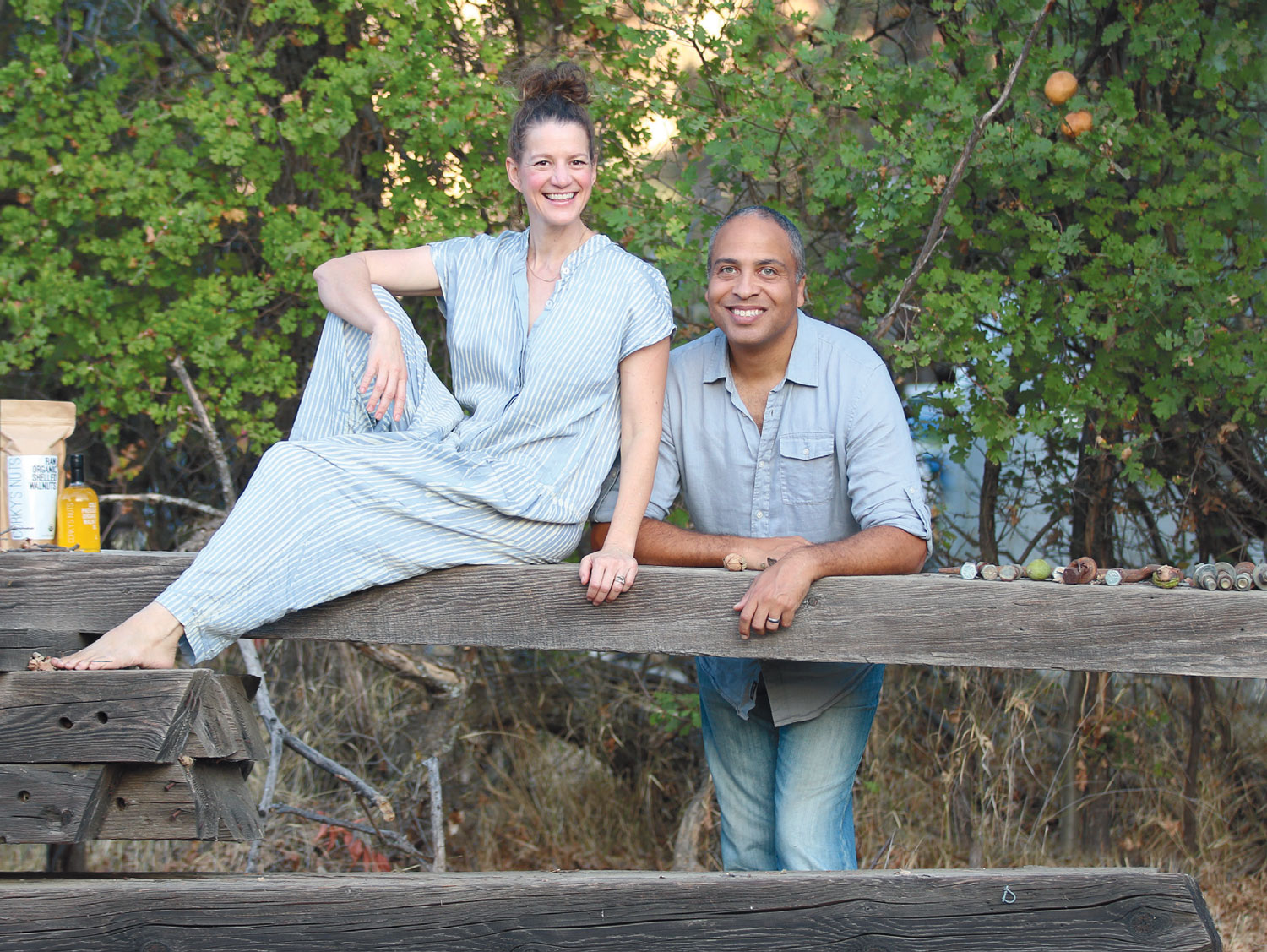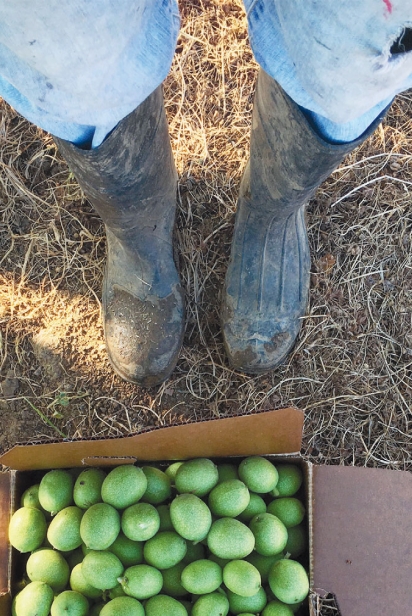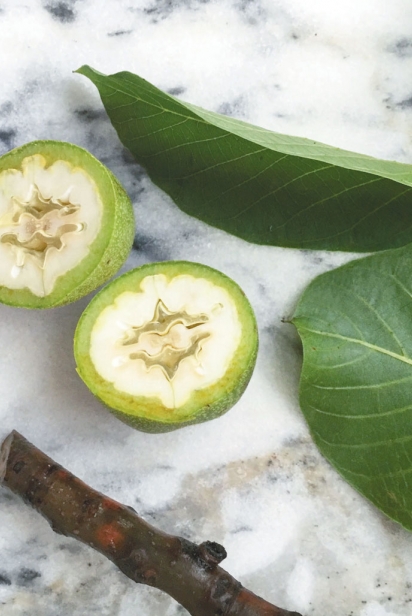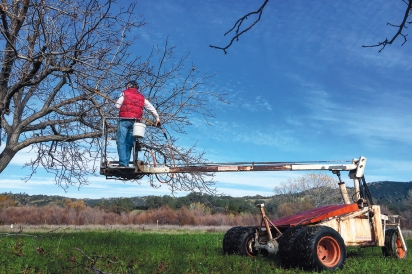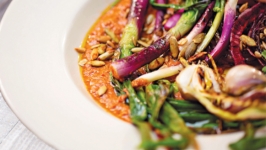Nut Cases
When I get on the phone with Nicole Facciuto and Eric Hargrove it’s clear that they are on the road. It’s loud, but we exchange greetings and jump right into what they’re up to and how they’re faring in the smoky Northern California air.
“It’s part of farming and running a business,” Nicole says. “There are always some kind of shenanigans. Expect the unexpected!”
They’re instantly energetic, fun and easy to talk to, so it’s not surprising to learn that they have backgrounds in entertainment. But their 5-year-old business is based in a very different arena: organic walnuts.
Named after her 76-year-old father—who, with his wife, Vicki, has run a walnut farm in Yolo County near Sacramento for 45 years— Corky’s Nuts “has funny multiple meanings” and can quickly “go down a road that is fabulously inappropriate,” Nicole says, laughing.
While the walnuts for their products are grown on the farm up north, the couple owns a “beautiful anomaly time-capsule” home and runs a separate certified-organic production and retail facility in Fillmore, where they sort, label and ship their organic products all themselves. “We hand-sort every single walnut,” she says, noting that they also make cold-pressed walnut oil, raw walnut butter, raw walnut meal and pickled walnuts, all certified organic.
“I want people to understand what a walnut tastes like and that they’re really delicious,” Nicole says. “We believe that few have ever had the chance to try a walnut fresh off the tree—right after harvest. Seasonal walnuts are very different than what you find in the grocery store aisle!”
According to the California Walnut Board, California produces more than 99% of U.S. walnuts and two-thirds of the world walnut trade. Walnuts are typically harvested late September through November. After hulling, washing and drying, many commercial walnut farms store the nuts in environmentally controlled silos, depending on the market demand. Most walnuts purchased from grocery stores can be up to one to two years old; once on store shelves or in bulk bins, they go unrefrigerated and their fragile oils quickly turn rancid.
“I’m, like, the nut disruptor!” Nicole jokes. “We’re trying to transform your relationship to walnuts, to understand the seasonality of food—including walnuts.”
Corky’s Nuts’ offerings are different than perhaps any other because they only sell the current harvest from the farm. “We sell out every year. Our process was always built on seasonality and stocking up for the year,” Nicole says. “Keep it like a squirrel does!”
A TASTE OF THE FUTURE
While working in television in New York in the early 2000s, Nicole would share some of the harvest from home with celebrity chefs on set. The flavor and freshness were so unique that the nuts were even served in some high-end NYC restaurants, (Per Se, for one). Since she grew up with fresh walnuts, she “didn’t understand why people were going nutty for these nuts!”
Eventually, she tasted “the night-and-day difference” for herself when Eric thoughtfully bought her a bag of store-bought organic walnuts on one of their first dates. She tasted, then promptly spat them out. That, she says, was her aha! moment.
In spite of the nut incident, in less than two years she and Eric were married and starting a business.
Eric considers himself a tech geek and had been involved in LA’s startup scene, including digital advertising, for which he still does some consulting. So, when it came to starting Corky’s Nuts and selling direct to consumers, he had some pretty good resources to know how to test the market. When I ask Eric if this is where he saw his future self—marketing, packing walnuts and pressing walnut oil—his answer is “1,000%, no!”
But their shared scrappy attitude, which Nicole says she inherited from the generations before her, gave them the gumption to start the company with $100 and set it up as a preorder system. “It’s about learning what you need to learn to create something; knowing you have the ability to build a brand, a farm, a company by simply reaching out to your community and figuring it out as you go,” says Nicole. “If it didn’t work, we’d be OK. Just knowing we were going to try was all that mattered in the moment.”
Having the nut business already online has certainly been advantageous during COVID restrictions. “More people have had to move online to acquire their goods,” says Nicole. “We’re also super grateful so many are even more connected to their food.”
They are both quick to point out that the walnuts do need to be refrigerated or frozen, and they enjoy educating their customers on how to avoid experiencing “old nuts.”
SOURCING THE NUTS
In 1975, after moving back to the States from Japan and committing to take over care for land belonging to Vicki’s parents, Corky consulted the local “old-timers” to figure out what would grow best in that climate. They chose walnuts to best utilize the land with the hope of providing enough extra income to eventually help put his kids through college. He planted the first orchard by hand in 1979.
A career in Japanese landscape architecture gave Corky the idea of giving plants and trees room to grow—not planting quite so close together as is the typical commercial practice for walnut farmers. Caring for the trees diligently, with regenerative and sustainable practices, led to a transformation of the land, orchard by orchard, into the farm that has so long served as a family business.
“He taught himself to farm just like we are teaching ourselves to grow this business,” Nicole says, adding that the business is a way to give back to the family and help support the farm.
Now, Eric says, “We are thinking ahead so that we are able to provide support for the farm when [Corky], the workhorse, decides he’d rather just tell us what to do.” That means learning Corky’s farming process for the orchards, including irrigation (which is mostly sourced from runoff), watering schedules, pruning, mowing the cover crops, etc. “We are working on being proactive in our learning approach, so that we can limit any possible downtime that would result because of a learning curve or knowledge gap.”
“At this point,” Nicole adds, “we’re just there to help Dad in whatever capacity he needs.”
Lucky for them, the farm is a bit magical. “It’s very peaceful,” says Nicole. “We always love being there.”
‘NO NUT IS WASTED’
Earlier this year, their cold-pressed organic walnut oil won the 2020 Good Food Award for best oil from the Good Food Foundation, which celebrates companies that excel in flavor, social and environmental practices. And this year, their pickled walnuts were just selected as one of the finalists for 2021.
Nicole and Eric are committed to develop products and use packaging with an eye to the least amount of waste possible. Raw organic walnut milk and an organic walnut oil body bar scented with walnut-tree-leaf-essence are just a few of the upcoming products that will be made with the less-aesthetic nuts and by-products of the oil. “No nut is wasted,” says Nicole. “Even the nuts that fall on the floor are for the chickens!”
For more information, visit CorkysNuts.com.


